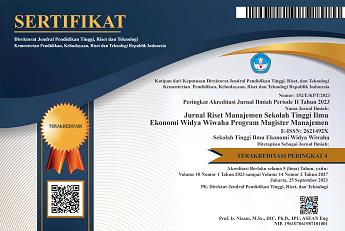PENGARUH ADOPSI IFRS TERHADAP MANAJEMEN LABA PADA PERUSAHAAN MENUFAKTUR YANG TERDAFTAR DI BEI TAHUN 2010-2014
DOI:
https://doi.org/10.32477/jrm.v3i2.74Keywords:
Adoption of IFRS, earnings managementAbstract
The purpose of this research is to determine the effect of the adoption of IFRS on earnings management is measured by three proxy smothing income, differentials change in net income (ΔNI), ratio of the middle of the difference changes the net income in the difference in the change in operating cash flow (ΔCF) and the correlation between the accrual and cash flow. In this study also uses control variables to capture whether there are other influences that different areas: size, leverage, growth and ROE. The population of this research is all manufacturing companies listed in Indonesia Stock Exchange 2010-2014. Sampling technique in this research is purposive sampling. Samples are 36 companies with a total of as many as 180. The sample observation method of data analysis used is multiple regression analysis. The results showed that there are significant adoption of IFRS on earnings management with significant value 0.023 less than0.05. Variable control of size, leverage and ROE affect the behavior of managers in performing earnings management practices with significant value size = 0,030, leverage = 0.000 ROE = 0.014 (less than0.05). While the growth control variables do not affect managers in earnings management practices.
References
Anggraita, Viska (2012), Dampak Penerapan PSAK 50/55 (Revisi 2006) Terhadap Manajemen Laba di Perbankan: Peranan Mekanisme Corporate Governance, Struktur Kepemilikan, dan Kualitas Audit, Journal Simposium Nasional Akuntansi (SNA) XV Banjarmasin.
Ashbaugh, H., dan M. Pincus (2012). “Domestic Accounting Standards, International Accounting Standards, and the Predictability of Earnings.” Journal of Accounting Research 39: 417-34.
Atarwaman, R.J.D. (2011), “Analisis Pengaruh Ukuran Perusahaan, Prfitabilitas, dan Kepemilikan Manajerial Terhadap Praktik Perataan Laba Yang Dilakukan Oleh Perusahaan Manufaktur Pada Bursa Efek Indonesia”, Jurnal Ilmu Ekonomi Adventege, Vol. 2, 19 February.
Barth, M.E., Landsman, W.R., & Lang, M.H. (2008), “International Accounting Standards and Accounting Quality, International Accounting Standards and Accounting Quality”, Journal of Accounting Research, 46, 467-498.
Baskerville, Rachel (2011). “100 Questions (and Answer) About IFRS”. Working Paper.
Chen, Huifa, Tang, Qingliang, Jiang Yihong and Lin, Zhijun (2010), “The Role Of International Financial Reporting Standards in Accounting Quality: Evidence From The European Union”, Journal Of International Financial Management & Accounting, Vol. 21, No. 3.
Dechow, Patricia. M, Richard G Sloan and Amy P Sweeny (1995), “Detecting EarningManagement”, Accounting Review, Vol 70 no.2.
Diniati, Ninna., dan Suhairi (2006), “Pengaruh Kandungan Informasi Komponen Laporan Arus Kas, Laba Kotor, Size Perusahaan Terhadap Expected Return Saham”, Makalah SNA IX.
Gamayumi, Rindu Ika (2009), “Perkembangan Standar Akuntansi Keuangan Indonesia Menuju Indonesia Menuju International Financial Reporting Standards”, Jurnal Ilmiah Berkala Enam Bulanan, ISSN 1410-1831. Vol. 14, No. 2.
Ghozali, Imam (2006), Aplikasi Analisi Multivariate dengan SPSS, Semarang: Badan Penerbit Universitas Diponegoro.
Gujarati, Damodar (2004), Basic Econometrics. Fourt Edition. The McGraw-Hill Companies.
Hair, JF, Anderson, R.I, Tathanm, R.I and Black, W.C. (1988), Multivariate Data Analysis, Prentice Hall.
Healy, P. And K., Palepu (2003), “How The Quest For Efficiency Corroded The Market”, Harvard Busines Review (July): 76-85.
Healy, P.M. (1985), “The Effect of Bonus Schemes on Accounting Decision” Journal of Accounting and Economics 7, p.85-107.
Hendriksen. Eldon S dan F. Van Breda (1992), Accounting Theory. Fifth Ed. Homewood Illinois: Richard D.Irwin. Inc.
Hsu, G., and P., Koh. (2005), “Does the presense of institutional investor influence accrual management? Evidence from Australia”, Corporate Governenance 13, 809-823.
Ismail, Wan., Adibah Wan, dkk (2013), “Earning Quality and The Adoptions Of IFRS-based Accounting Standards Evidence From an Emerging Market”, Asian Review Of Accounting, 21 (1): 53-73.
Jones, Jefferson P et al. (2009), Cornerstone of Financial & Managerial Accounting Current Trends and Update. Mason: South-Westren Cengage Learning.
Kurniawati, Lintang (2014), “Pengaruh Adopsi IFRS Terhadap Manajemen Laba Pada Perusahaan Manufaktur Yang Terdaftar di BEI”, Tesis Universitas Sebelas Maret Surakarta.
Lang, M., J. S. Ready., and Wilson (2006), “Earning Management and Cross Listing: Are Reconciled Earning Comparable To US Earning?” Journal Of Accounting and Economic.
Purwanti (2012), “Pengaruh Kecakapan Manajerial, Kualitas Auditor, Komite Audit, Firm Size dan Leverage Terhadap Earning Manajemen”, Skripsi, Universitas Diponegoro Semarang.
Rohaeni, Dian., dan Titik Aryati (2011), “Pengaruh Konvergensi IFRS terhadap Income Smothing dengan kualitas Audit Sebagai Variabel Moderasi”, Makalah SNA : 15, 100- SOPE-22.
Rudra, Titas dan Bhattacharjee (2012), “Does IFRS Influence Earning Management? Evidence from India”, Journal of Management Research Finance and Control Group, India Institute of Management Calcuta. ISSN 2012, Vol.4, No.1:E17. http:// www.macrothing.org
Santy, Prima, Tawakal, Grace. Pontoh (2012), “Pengaruh Adopsi IFRS Terhadap Manajemen Laba Pada Perusahaan Pebankan di BEI”, Working Paper.
Schipper, K. (1989), Commentary on Earnings Managements. Accounting Horizons 3, 91- 102.
Scott, W. R. (2000), Financial Accounting Theory, Ontario: Prentice Hall.
Trisanti, LL. dan Zulaikha (2012), “Analisis Pengaruh Karakterisitik Perusahaan Terhadap Kelengkapan Pengungkapan Sukarela (Study Pada Perusahaan Manufaktur Yang Terdaftar di Bursa Effek Indonesia Tahun 2006-2010)”. http:// eprints.undip.ac.id/35665/1/Jurnal Skripsi Leony Lovancy T.pdf
Watt, R.I, Zimmerman, J.L. (1986), Positive Accounting Theory, Prentintice Hall International, Inc.
www.idx.co.id









